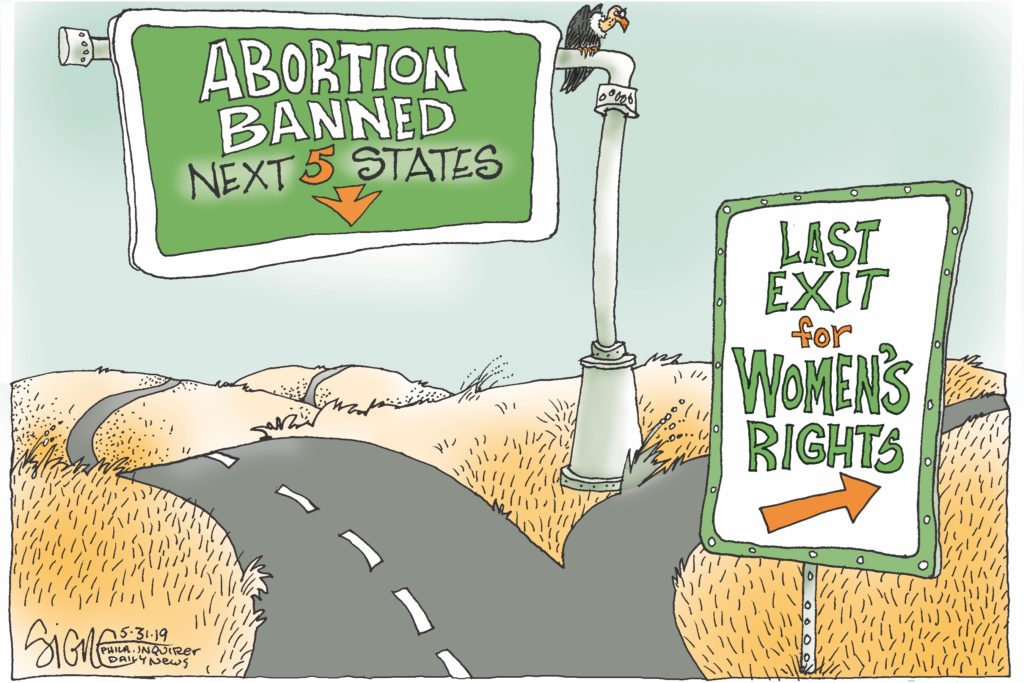
and the Cartoonist Group. All rights reserved.
Jennifer and Jake are newly-weds. The couple met in graduate school at Texas Tech University in Lubbock, Texas. She is working toward a degree in engineering and he is studying to be a nurse practitioner.
They were doubly cautious about contraception. Although they want at least one child in the future, first they want to meet their educational goals. In addition to using condoms, they avoided sex when she thought she might be most fertile. Then they had a condom break. Jennifer kept an online menstrual diary “mymonthlycycles.com” and the next morning was horrified to find that she might have been fertile at that time. When her period was late and breasts started to be tender, she was sure she was pregnant.
Since online calendars can be monitored by the “Texas abortion police”, one of the first things she did after she stopped crying was to delete that information. Next, she asked a friend who had had an abortion where she could go. She contacted all the New Mexico clinics, but they were either too busy or the availability of appointments conflicted with their student responsibilities. Finally, she made an appointment at the Durango Planned Parenthood clinic. Jake had an afternoon class on Monday, but if they slept a bit and left Lubbock before midnight, they could reach Durango in time for the 10:30 appointment.
The couple was greeted by people yelling and waving signs outside Planned Parenthood’s parking lot. The armed guard just inside the door was much more friendly, but said that Jake needed to wait outside in the car, and Jennifer would join him in 2 or 3 hours.
An hour later she woke exhausted Jake to tell him good news. “I fell asleep while filling out the forms, but the first thing they did” she said, “was a pregnancy test. It was negative—I’m not pregnant!” Jennifer was so frightened by the new Texas laws that she was afraid to buy a pregnancy test. Instead, she took the evidence of pregnancy that her body gave her, not realizing that women can have anovulatory cycles which mimic pregnancy.
This narrative recounts the stories of real patients, but the names and situation are fictional.
Only 2 of 40 countries that have changed their abortion laws since 2000 are more restrictive; Nicaragua and the USA. The other 38 have increased access to safe abortions services. Ethiopia reformed its abortion laws in 2004 in response to the high death rate of women having illegal abortions. Its maternal mortality rate now is less than half of what it was before the legal reform. Already too many women are dying in the USA from pregnancy complications, but that figure will skyrocket as desperate women seek care where abortions are illegal.
It took the high-profile death of a woman for the law to be changed in Ireland. This very Catholic country had banned all abortions with an amendment to its constitution. In 2012 Dr. Savita Halappanavar was sick with an infected miscarriage. She requested a D&C, but was told that she couldn’t have it as long as the fetal heart was beating. It was too late when the fetus did die; the mother perished from sepsis shortly after.
For me, the overthrow of Roe v. Wade by the US Supreme Court wasn’t a surprise. Politicians, in league with churches using abortion as their rallying cry, had been pushing to make abortion illegal for decades. All the articles I’ve read have decried the tragedy to human rights, but none has mentioned that the subsequent increasing human population will have global repercussions. What can we do? Support people coming for abortion care from antiabortion states. Donate to Planned Parenthood, the National Network of Abortion Funds, Cobalt ProChoice Colorado. Most important, vote for prochoice politicians; we need laws and constitutional amendments to guarantee access to safe abortion care. Please remember, the majority of Americans are prochoice.
©Richard Grossman MD, 2022